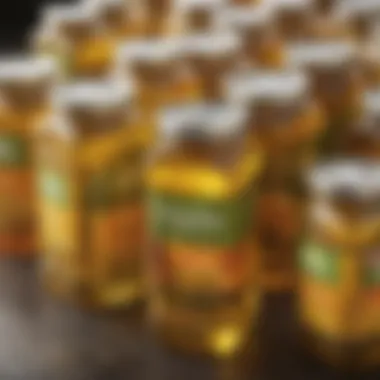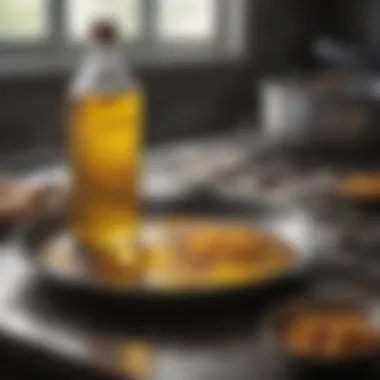Proper Disposal of Cooking Oil: Best Practices


Intro
Cooking oil is an essential ingredient in many cuisines. However, the proper disposal of used cooking oil is often neglected. When cooking oil is improperly discarded, it can lead to significant environmental issues. For individuals who enjoy cooking, it is important to understand how to dispose of this waste responsibly. This article aims to provide a comprehensive guide that highlights best practices for disposing of cooking oil, emphasizing both personal health and environmental impact.
Improper disposal, such as pouring oil down the sink or toilet, can cause plumbing issues or lead to water contamination. This can also harm local wildlife and disrupt ecosystems. Understanding the consequences of careless disposal is crucial for anyone who values sustainability. Here, we will explore various methods of disposal, along with sustainable practices to minimize risks and environmental impact.
Preamble to Cooking Oil Disposal
The disposal of cooking oil is a significant topic among home cooks and culinary enthusiasts. Many do not consider the environmental impact of their choices in this aspect. Understanding how to properly dispose of cooking oil contributes not only to personal health but also to the well-being of the environment. In this section, we will focus on the importance of proper disposal and the consequences of improper disposal.
Importance of Proper Disposal
Proper disposal of cooking oil is crucial for various reasons. First, it prevents environmental contamination. When cooking oil is improperly thrown away, it can seep into the soil and waterways, leading to pollution. This is particularly harmful to aquatic life. Secondly, it protects plumbing systems. Pouring oil down the drain can generate clogs, leading to costly plumbing issues. Most importantly, it promotes sustainability. By following responsible disposal methods, individuals contribute to waste reduction and resource conservation. The knowledge of how to handle used cooking oil can help foster a culture of mindfulness toward waste management.
Consequences of Improper Disposal
Improper disposal of cooking oil leads to serious consequences. One of the primary risks is contamination of natural resources. Oil can create slicks on the water surface, inhibiting the oxygen exchange which aquatic organisms depend on. Furthermore, inappropriate disposal methods may result in fines or legal actions in some jurisdictions.
"Every liter of disposed oil can contaminate up to a million liters of water; it is imperative to understand how to handle it appropriately."
In addition, the economic implications cannot be ignored. Blocked sewage systems due to oil can lead to delays in treatment facilities processing wastewater. This results in additional operational costs that can affect local municipalities, and ultimately taxpayers.
To conclude, understanding the proper disposal of cooking oil is vital for ecological balance and societal welfare. The next sections will delve into various methods of disposal and best practices to ensure that cooking oil is managed responsibly.
Understanding Cooking Oil
Understanding cooking oil is essential for effective disposal and management. This section elaborates on various types of cooking oils and their implications for health and the environment. A clear comprehension of cooking oils helps in making informed decisions about their disposal. Each type of oil has unique consumer preferences, nutritional values, and environmental impacts. Thus, knowing the different kinds aids in selecting not only the right oil for cooking but also the right method for disposal.
Types of Cooking Oils
Vegetable Oils
Vegetable oils are derived from various plant sources. Common examples include soybean oil, canola oil, and olive oil. Their key characteristic is that they are generally lower in saturated fats compared to animal fats. This feature makes vegetable oils a popular choice for many home cooks. They are often considered healthier options for cooking, especially for frying and sautéing. However, they can degrade quickly at high temperatures, which may affect their safety.
One advantage of vegetable oils is their versatility in the kitchen. They can be used for baking, dressing salads, or frying. Yet, sometimes they come from large, monoculture crops that can impact the environment negatively. Understanding these oils' production methods can lead to better decisions concerning their purchase and disposal.
Animal Fats
Animal fats, such as lard and tallow, are derived from animal tissues. They are known for their rich flavor and high smoke point, making them suitable for various cooking methods, particularly frying. One significant advantage of using animal fats is their ability to enhance taste in many dishes. However, they also contain higher levels of saturated fats, which can pose health risks if consumed in excess. Some health-conscious individuals may choose to limit or avoid animal fats altogether.
In terms of disposal, improper disposal of animal fats can lead to plumbing issues, similar to vegetable oils. Therefore, understanding how to manage their disposal is crucial. People might find it beneficial to render and reuse these fats, instead of simply discarding them immediately after cooking.
Specialty Oils
Specialty oils include oils like coconut oil, avocado oil, and sesame oil. These oils are often sought after for unique flavor profiles and specific culinary uses. For example, coconut oil is praised for its aromatic quality, while avocado oil stands out for its high smoke point and nutritional benefits. One of their key advantages is their ability to cater to dietary preferences, such as vegan or paleo diets, making them popular among health enthusiasts.
However, specialty oils can sometimes be more expensive and less readily available than standard vegetable oils. They may also require more care in how they are stored and utilized, as many of them can degrade more quickly. Thus, their disposal also needs careful consideration.
Impact on Health and Environment


The disposal of cooking oil impacts both personal health and environmental safety. Improper disposal can lead to clogged drainage systems and contribute to larger environmental issues such as water pollution. Cooking oils contain fats and compounds that can disrupt aquatic ecosystems if they enter water bodies. It is vital to understand the issues surrounding disposal, as the choice of oil can influence not just health outcomes but also the broader ecological landscape.
"Proper disposal methods are crucial to prevent environmental damage and maintain public health."
By using this information regarding different types of cooking oils, consumers can better navigate their cooking and disposal practices. Educating oneself about these elements supports not only personal health but also contributes positively to the environment.
Methods for Disposing of Cooking Oil
Disposing of cooking oil properly is essential in maintaining not only a clean kitchen environment but also contributing to environmental sustainability. Used cooking oil can create significant problems if discarded incorrectly. Thus, understanding effective disposal methods is key to minimizing harm to plumbing systems and natural water sources. By following the right procedures, individuals can promote better waste management practices and enhance the life quality of their communities.
Recycling Cooking Oil
Benefits of Recycling
Recycling used cooking oil offers a viable and eco-friendly solution to disposal concerns. One major benefit is transforming waste oil into biodiesel, a renewable fuel alternative. This process reduces reliance on fossil fuels. Moreover, recycling cooking oil can lead to significant energy savings, as producing biodiesel from food waste is often less resource-intensive than traditional oil extraction.
Recycling cooking oil also helps reduce landfill waste. When more people choose recycling, the amount of oil that goes to landfills decreases. This low-impact disposal option is beneficial for both personal and environmental health. Therefore, it encourages responsible habits in the kitchen.
Where to Recycle Cooking Oil
Finding a proper recycling center for cooking oil can be straightforward. Many municipalities have specific drop-off locations for recycling waste oil. Understanding local options enhances community engagement in eco-friendly practices. Resources like the Environmental Protection Agency provide information on recycling facilities, assisting in enhancing community support for sustainable practices.
Unique to this recycling method is that the collection process may sometimes include partnerships with restaurants and schools, making recycling easily accessible. However, not all areas have sufficient recycling options. It may require personal research to locate the nearest facility.
Composting Cooked Oils
Is It Safe?
Composting cooked oils is a nuanced area of disposal. It involves integrating small amounts of used cooking oil into compost systems. Some experts argue that when done correctly, it can be safe. This technique can contribute beneficial fats to compost, fostering better nutrient-rich soil. However, it is crucial to use oils sparingly to avoid attracting pests and creating imbalanced compost mixture.
The benefit of this method lies in its ability to reduce waste while enriching soil for gardening. Careful consideration of amounts will make it a favorable choice for those interested in gardening or organic practices.
Guidelines for Composting
To successfully compost used cooking oil, specific guidelines should be followed. First, limit the amount to no more than 1/4 cup per compost bin. This ensures the balance of materials isn’t disrupted. Second, mix the oil thoroughly with dry materials to promote even breakdown.
Properly turning the compost regularly aids in aeration and speeding up the decomposition process. The advantage of composting oils is primarily seen in enhancing soil health, making it an appealing option for conscientious gardeners. Care should be taken, as incorrect practices might result in sticky and smelly composts.
Disposing in Trash
How to Do It Properly
If recycling or composting is not viable, disposing of used cooking oil in the trash can be an acceptable option. To do this correctly, allow the oil to cool completely first. Pour the cooled oil into a non-recyclable container, such as an empty bottle or jar. Ensure it is sealed tightly before placing it in the trash.
This method is straightforward and can prevent unwanted leaks during waste collection. Caution should be taken in ensuring the container is not made of recyclable materials, as this practice could lead to contamination of recycling streams.
Container Considerations
Choosing the right container for disposal is significant. Ideally, the container should have a lid that closes securely. Containers made of plastic or glass can work but must not be in any recyclable categories. Using cardboard to absorb smaller amounts of oil can also be an alternative.


The critical point in this method is preventing waste from spilling or leaking during collection and transport. Proper container use ensures a safer disposal experience while still minimizing environmental risks.
Wastewater Treatment Facilities
Understanding Wastewater Processes
After improper disposal, used cooking oil can end up in wastewater systems. Understanding the processes at these facilities highlights limitations in their ability to handle oils. Wastewater treatment plants are designed to process various waste materials, but large volumes of oils can create significant operational issues. Too much oil can disrupt biological processes within treatment systems, reducing efficiency.
Leveraging this knowledge is vital when considering oil disposal options. Engaging with local treatment facilities may provide insights into their capabilities and promote responsible waste management strategies that avoid causing strife within wastewater management.
Limitations for Home Disposal
Home disposal of cooking oil within plumbing presents notable limitations. Dumping oil down the sink can lead to clogging and pipe damage over time. Most households lack the capacity for oil processing like that of a treatment facility. Hence, home disposal through sinks or toilets should always be avoided.
The essential takeaway is the recognition of overflow impacts on municipal systems. Understanding these limitations encourages better practices at the household level and greater awareness of personal contributions to community waste management.
Best Practices for Oil Management
Effectively managing cooking oil is essential for both health and environmental reasons. Practicing proper oil management can reduce waste and promote sustainability. This article emphasizes methods that enable cooks to minimize oil usage, store it correctly, and educate others about best practices. By understanding these principles, stakeholders can positively impact not only their kitchens but also the broader community.
Minimizing Oil Usage
Healthy Cooking Techniques
Healthy cooking techniques are vital in reducing the overall consumption of cooking oil. Methods such as steaming, grilling, and baking require little to no oil, making them healthier alternatives to frying. The key characteristic of healthy cooking techniques is their focus on preserving nutrients without excessive fat.
These methods allow individuals to prepare meals that are both nutritious and lower in calories. Healthy cooking is popular among those looking for weight management strategies and overall wellness. The unique feature is the use of various herbs and spices to enhance flavor without relying on oil. However, some may find that these techniques require more time and practice to master.
Alternatives to Deep Frying
Alternatives to deep frying are also crucial in the effort to cut back on oil use. Techniques like air frying or shallow frying can provide similar textures and flavors without the excessive oil typically associated with deep frying. The distinguishing trait of these alternatives is their ability to create crispy and appetizing dishes with significantly less oil.
These practices not only contribute to a healthier lifestyle but leave a smaller ecological footprint, which aligns well with sustainability efforts. The unique aspect of these methods is their versatility in adapting traditional fried recipes. Yet, some might argue that these alternatives do not replicate the exact frying experience, which needs to be considered.
Storing Used Cooking Oil
Proper Storage Methods
Proper storage methods for used cooking oil are essential for maintaining its quality and extending usability. Ensuring that oil is cool before storage prevents any changes in chemical composition. The key characteristic of proper storage methods includes using dark, airtight containers, which help to keep out light and oxygen, both of which can cause rancidity.
This practice is beneficial as it allows users to reuse oil several times instead of disposing of it immediately. The unique feature of proper storage is the importance of labeling containers with the date and type of oil. One disadvantage is that improperly stored oil can quickly go bad, leading to possible health risks.
Signs of Oil Spoilage
Understanding the signs of oil spoilage is crucial for effective management. A rancid smell, changes in color, or cloudiness are all indicators that oil has become unhealthy to use. The key characteristic of recognizing spoilage signs is awareness of oil's sensory properties. Identifying spoilage prevents health risks associated with consuming bad oil.
Knowing when oil has spoiled allows for the timely disposal of unusable products. The unique feature here is that spoilage can happen much more quickly depending on how the oil is stored. Neglecting to recognize these signs can lead to waste and health concerns.
Educating Others


Community Involvement
Community involvement plays a significant role in promoting oil management best practices. Engaging neighbors and local organizations can foster awareness and create a culture of sustainability. The key characteristic of community involvement is collective effort, which amplifies the impact of individual actions. It promotes an understanding that proper disposal and management of used cooking oil is a shared responsibility.
Involving the community is beneficial as it encourages everyone to participate in sustainable practices. The unique feature of this approach is that it can lead to shared resources, such as local recycling programs for used cooking oil. One possible disadvantage is overcoming community inertia or lack of interest in environmental issues.
Workshops and Demonstrations
Workshops and demonstrations offer practical ways to educate people about oil management. These events can most effectively teach techniques for disposal and recycling. The key characteristic of workshops is hands-on engagement, which can deepen understanding. By providing practical skills, participants can learn directly how to manage cooking oil responsibly.
These sessions are beneficial in creating a knowledgeable community, as participants can share their experiences and insights. The unique feature of workshops is their ability to cater to varied audiences, from home cooks to culinary professionals. A potential disadvantage could be lower attendance if not effectively promoted.
Proper management of cooking oil not only protects personal health but also contributes to a healthier environment. The community’s collective efforts will surely lead to more effective waste reduction.
Regulations and Guidelines
Regulations and guidelines play a crucial role in the proper disposal of cooking oil. They provide the framework necessary to protect public health and the environment. Understanding these regulations helps individuals make informed decisions regarding their oil disposal practices. That way, we can reduce pollution, health hazards, and further degradation of ecosystems.
Gone are the days when improper disposal was a minor inconvenience. Nowadays, the impact of cooking oil has far-reaching implications. Knowing local regulations ensures that home cooks comply with laws aimed at minimizing waste. It also helps when addressing the disposal of used oil responsibly, thus contributing to a sustainable future.
Local Regulations on Oil Disposal
Local regulations regarding oil disposal can vary significantly depending on the region. Many municipalities enact regulations to manage waste efficiently and reduce environmental risks. Most localities have specific guidelines on how to dispose of cooking oil. This often includes designated drop-off points or recycling programs. Some areas may impose fines for improper disposal, especially if cooking oil clogs sewer systems or leads to water pollution.
Home cooks should familiarize themselves with these regulations. Checking with local waste management or public health departments is a good starting point. This is necessary because the violation of these rules can result in penalties and contribute to larger environmental issues. Furthermore, various communities offer educational resources that detail safe disposal methods, which can be very helpful.
Environmental Agencies' Recommendations
Environmental agencies provide recommendations based on research and policies focused on waste management. These organizations advocate for practices that not only protect public health but also promote sustainable living. Their recommendations usually include guidelines for proper disposal methods and best practices for waste reduction.
For instance, agencies often suggest that cooking oil should never be poured down the drain. This not only leads to blockages but can also affect local water supplies. Instead, they recommend recycling cooking oil at specialized centers or repurposing it for biodiesel, which is an environmentally-friendly alternative.
In addition, agencies may publish educational materials that highlight the benefits of proper disposal of cooking oil. This information serves to increase awareness of the environmental impact and health implications of improper waste management.
"Proper disposal is not just a responsibility; it's a necessity for the health of our environments and communities."
Therefore, keeping informed about both local regulations and environmental agencies' guidelines is essential for anyone aiming to dispose of cooking oil responsibly. Understanding these factors contributes not only to personal habits but also fosters a collective commitment to environmental sustainability.
End
The conclusion of this article serves as a critical reflection on the significance of proper disposal of cooking oil. As cooking oil is a common kitchen byproduct, unaddressed disposal can lead to environmental hazards and costly plumbing issues. Understanding the correct methods of disposal is essential not only for maintaining hygiene in our homes but also for reducing the detrimental impact on our planet.
Summary of Key Points
To summarize the core ideas presented:
- Importance of Proper Disposal: Responsible practices help safeguard personal and environmental health.
- Methods Available: Options range from recycling to safe disposal through wastewater facilities, each method having its own set of guidelines.
- Best Practices: Minimizing oil use, storing properly, and educating others fosters a culture of sustainability.
- Regulatory Compliance: Awareness of local regulations can prevent legal issues and promote community well-being.
By adopting these principles, individuals can make informed choices that benefit both their kitchens and the environment.
Encouragement for Sustainable Practices
Encouraging sustainable practices in cooking oil disposal goes beyond individual actions. It fosters a community dedicated to preserving ecological balance. Here are some key actions to consider:
- Participate in Community Initiatives: Join local clean-up or recycling efforts to enhance awareness about oil disposal.
- Share Knowledge: Educate family and friends about the importance of proper disposal, leveraging platforms like social media.
- Vote with Your Purchases: Opt for oils that come in recyclable packaging, thereby supporting brands with sustainable practices.
- Stay Informed: Keep up with evolving regulations and best practices for oil disposal, ensuring that your practices remain effective.







